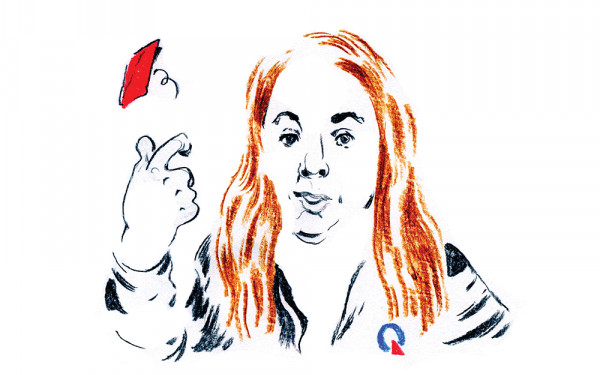Quebec’s Political Parties on Tuition Fees and University Funding
Candidates Discuss Their Visions for the Future of Higher Education in the Province
A lot has changed in terms of higher education since the last provincial election in 2012, which followed an extended period of student protests against the then-Liberal government’s proposed tuition hikes.
Quebec’s opposition parties are critical of the way the Parti Québécois has handled the higher education portfolio, calling the government’s actions a “failure” and “hypocritical.” As the provincial election campaign enters its final stretch, diverging visions for how Quebec’s system of higher education should be financed are emerging between the different political parties in the running.
During the 2012 student strike movement, then-Fédération étudiante collégiale du Québec president Léo Bureau-Blouin argued in favour of a freeze on university tuition fees.
An MNA for the PQ since September 2012, he now calls the government’s indexation of tuition fees a “great compromise” and “a big victory for students.”
“I defended a tuition fee freeze when I was a student representative and I still believe this is a great way to increase accessibility to post-secondary education,” he said.
“But the objective of the summit on post-secondary education was to find a compromise following the student protest movement of 2012. […] The Liberals wanted to hike the tuition fees by 82 per cent over seven years, so when you compare what students would have paid at the end of this 82 per cent tuition fee increase and what they are going to pay now, there’s $1,400 of difference.
“This is real money that students will save.”
The Indexation of Tuition
Once in favour of tuition hikes, the Quebec Liberal Party now supports indexation as implemented by the PQ, according to Pierre Arcand, the party’s critic for higher education.
“I think we need to digest the events of 2012,” he said. “We don’t want to revisit right now those tuition hikes that you have seen under the Charest government. We are going to take a softer approach on this.”
Still, the party believes university students should pay their fair share for their education.
“We’ve said that the tuition fees should be anywhere between 15 and 17 per cent of the total cost of education per student,” Arcand said.
For Stéphane Le Bouyonnec, the Coalition Avenir Québec’s critic for higher education, the PQ government managed the higher education portfolio—and the tuition issue more specifically—“in a hypocritical way by making people believe certain things and doing the opposite.”
Le Bouyonnec said he was “shocked” to see the PQ government reduce the tax credits that students can receive for their tuition fees after saying it was indexing tuition.
An article published in La Presse last week stated that the province reduced the tax credit for tuition from 20 to eight per cent. For many students, that will effectively amount to an increase in tuition of 18 per cent, the article noted.
According to Le Bouyonnec, the reduction in the tax credit will negatively affect a lot of students who work to pay for their studies because their parents don’t support them financially, as well as older students returning to university.
But for Bureau-Blouin, the government made the right decision in opting to reduce the tax credits.
“What [the journalist] in La Presse is not saying is what we did with the money from the tax credits,” he said, adding that the money saved by the government was used to increase student loans and bursaries.
“Before, when you had family income of $35,000, the government was beginning to cut in your loans and bursaries. Now we have increased this threshold to $45,000. This will increase accessibility to the loans and bursaries program to 50,000 more students.
“All of the studies that have been made on the tax credits show that it has almost no impact on accessibility to post-secondary education. Why? […] More than 50 per cent of university students don’t pay income taxes, so they can’t choose the tax credits,” he continued.
Bureau-Blouin said the two options for students who don’t make enough money to pay income taxes aren’t ideal—they could either save their tax credits for later, once they have enough income to start paying taxes, or they could transfer the credits to their parents.
“I defended a tuition fee freeze when I was a student representative and I still believe this is a great way to increase accessibility to post-secondary education.”
—Parti Québécois MNA Léo Bureau-Blouin
Like the Liberals, the CAQ is in favour of the indexation of tuition fees—at least for now.
In the future, the party could try to increase some universities’ autonomy by allowing them to charge tuition fees “in relation to what the market can take, to their reputation, to their costs,” while keeping accessibility the main focus at other universities, Le Bouyonnec said.
“We think that Quebec has sufficiently democratized access to university,” he added. “Now, it’s important to not favour accessibility to the detriment of excellence.”
Universities Looking for Funding
There is also considerable debate over whether universities are receiving enough funding from the province. The PQ government cut universities’ operating grants by $250 million in December 2013.
For Concordia, that translated to $13.2 million less in each of the 2012-2013 and 2013-2014 fiscal years, according to a statement posted on the university’s website. Beginning in 2013-2014, the academic sector had to reduce costs by 2.5 per cent, while other sectors reduced costs by 6.6 per cent.
“[Premier Pauline] Marois, at the summit on higher education, indicated that the cuts of $250 million per year would not be recurrent, would be temporary, whereas we’re learning today that these cuts are permanent,” said Le Bouyonnec.
“I know that universities are facing difficult times right now, but we want to gradually increase the funding that is given to the universities,” said Bureau-Blouin, referring to the PQ’s pledge to invest an additional $1.7 billion over a seven-year period.
“We also think that universities must look at their management. We think that some arguable decisions have been made in the past,” he added, offering spending on management’s salaries as an example.
Arcand said the Liberals were able to spend more on higher education because they were able to generate more tax revenues.
“We were better in terms of dealing with the economy in a period of recession than they are right now in a period where, I think, around the globe, everything seems to indicate that the economy is bouncing back,” he said. “When you have a government that decides to talk about [a] referendum [and] that comes up with a [proposal for a Charter of Values] that divides people, I don’t think it creates a good climate for investments in the province.”
Le Bouyonnec said the CAQ has “the most ambitious program for the universities” and would set aside $1 billion to allow universities to have additional satellite campuses and research centres as part of their plan to turn the St. Lawrence Valley into a corridor of innovation.
Support for Free Post-Secondary Education
Québec solidaire and the Green Party of Quebec, meanwhile, are arguing in favour of free post-secondary education.
“We think that free education is the only way to guarantee that there are no financial barriers to post-secondary education, so for us, it’s a question of social justice,” said Alex Tyrrell, who was a 25-year-old Concordia student pursuing a degree in environmental science when he was elected leader of the Greens last fall.
When asked if it’s financially feasible for the Quebec government to implement free post-secondary education, both Tyrrell and Québec solidaire candidate Manon Massé argued that their parties’ stances are not utopian.
“Presently, the Parti Québécois and the Liberal Party refuse systematically to go and get the money where it can be found,” said Massé.
She said the province could reintroduce a tax on the capital of financial institutions such as banks and insurance companies or could try to deal with the problem of $165 million currently leaving the province every year for tax havens overseas.
“Free education, as with free dental care and free public transit, are really questions of priorities,” said Tyrell. “Quebec should make government services accessible to the citizens who are against the user-payer agenda.”
This is the first article of a two-part series on the political parties’ positions on issues related to higher education ahead of the April 7 election. Click here to read the second article in the series, which is about the parties’ plans for university governance.


_600_832_s.png)


1_600_375_90_s_c1.jpg)
_600_375_90_s_c1.jpg)